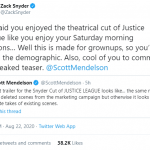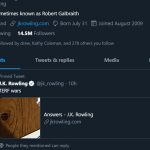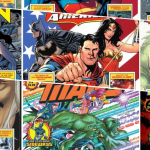FANDOM SPOTLIGHT: Fan Based Activism Research Project
As part of our San Diego Comic-Con Press Coverage Logistics fundraiser we’ve set up a special Fandom Spotlight series to highlight some of our contributors. This week we had a chance to talk with Ashley Hinck about her research project focusing on fan based activism or ‘fan-based citizenship performance’.
First of all, tell us a bit about your research project.
My research project examines how fandom and civic actions can be connected. I focus on what I call “fan-based citizenship performances.” I know it’s a mouthful and a little academic-y. But what the term points out is that civic actions that grow out of a fan commitment and sensibility are actions that citizens take—just like voting. In my research, I examine cases from across fan communities, including Harry Potter, Star Wars, The Justice League, the VlogBrothers, and Nebraska Husker football.
Most of these cases involve taking values (some kind of ethical framework) from the popular culture fan-object and applying it to a public issue. In the case of the Harry Potter Alliance’s “Not in Harry’s Name” campaign, that was using Harry and Hermione’s support of workers rights and skeptical activism and applying it to the issue of fair trade. In the case of DC Entertainment’s “We Can Be Heroes” campaign, that was using the Justice League’s emphasis on helping everyday people and cooperating to solve global problems in order to end starvation in the horn of Africa. Even in football fandom, the mentoring nonprofit TeamMates applied Husker football’s emphasis on helping the team and working hard to beat difficult opponents to volunteering to mentor. The deep commitment we all feel as fans to our fan-object is what makes fan-based citizenship so powerful.
What made you decide to focus your research on fandom, specifically fan based activism?
As an undergraduate, I was a communication and rhetoric student. In class, I was reading all of this research about social movements and how they work, but none of the research seemed to even remotely explain how fan activism and fan-based citizenship performances work. As a fan, I knew fan-based citizenship performances were really powerful, but it wasn’t being reflected in the research I was reading. So I decided to go to graduate school and do the research myself. I hope that my research project helps other scholars across political science, communication, and media get a better understanding of what fan-based citizenship performances are, why they are emerging, and how they work.
But of course, fans already know what fan-based citizenship performances are and know that they are powerful. For fans, I hope my research project gives them a new view of fan-based citizenship performances—helps fans view these civic actions in a sort of meta way. I hope that my research project gives fans a big picture view of what’s going on in civic action and how fan-based citizenship performances fit into that. And I hope that by putting cases from pretty different fandoms next to each other, we might begin to see new allies and collaborators—even across fandoms.
Have you participated in any fan-based activities like the ones you’re analyzing in your project?
Absolutely! I tend to participate in most of the campaigns I research by helping circulate their message and often by donating money myself. I briefly worked as a volunteer for the Harry Potter Alliance after I graduated from college and before I started graduate school in the fall. (I have to admit that I don’t think I was a great staff member for the HPA. I was tentative and unsure of myself- all the other staff members were remarkably experienced and innovative. I’m sure no one remembers me from those brief six months I volunteered). I also served as an intern for TeamMates during the summer of 2009.
What fandoms are you currently in and what’s your involvement?
Admittedly, I don’t have a whole lot of time to be a fan of things other than the ones I’m researching. As fans know well, fandom is time-consuming! And learning how to be a comics fan, a nerdfighter, and a football fan from scratch took a lot of work! I couldn’t have done it without the generosity of fans in those communities who took the time to teach me what it meant to be a fan in their fan communities. They told me what to read and what to watch, what websites to check out, and helped me understand the history and values of their fan communities. I am forever in their debt.
Beyond comics fandom, Nerdfighteria, and Husker football, I try to at least watch/read the things that have the most active fandoms, even if I haven’t had a chance to dive down deep and read fan fiction or go to conventions. I love watching Parks and Rec, Downton Abbey, The Walking Dead, and Star Trek, and I love reading science fiction (Ann Lecki, Margaret Atwood, Octavia E. Butler, Lois McMaster Bujold, etc.) and young adult books (John Green, Kristin Cashore, Suzanne Collins, etc.). I really need to start watching Supernatural. That’s next on my list.
What was your very first fandom? What type of effect did it have on you?
Harry Potter was my very first fandom. Though I had read the Harry Potter novels as a child, my good friend Anne Szczubelek was the one who introduced me to fandom. Anne was my guide through the Harry Potter fandom—she showed me the best news sites and gave me mix CDs of the best wizard rock. And she helped me host The Whomping Willows for two awesome concerts at my house in Omaha, Nebraska. Basically, Anne helped me fall down the rabbit hole of fandom. And I’ve never looked back. I think I spent all my extra money in college on Harry Potter cons. I even missed a wedding I was invited to because I had already made plans to go to Prophecy in Toronto.
Finding fandom was like finally finding a place where wanting to read books at home or at the boring family bar mitzvah was normal (my family still makes jokes about that one and it was ten years ago). I love how fandom is a place where genuine enthusiasm is valued, not hidden. There’s nothing like entering a fan convention and feeling a rushing sensation in which I realize “I’m not alone.”
Will your finished research be available for others to read? If so, where?
![Screen-Shot-2014-06-03-at-9.03.51-AM[1]](https://thegeekiary.com/wp-content/uploads/2015/03/Screen-Shot-2014-06-03-at-9.03.51-AM1.png) I hope I’ll be able to publish my research as a book that will be widely available, but that’s still one or two years off. I’ll have summaries of the nerdfighter and comics fans surveys posted on my website (ashleyhinck.com) within the next couple of weeks or so. And if you’re interested in hearing more about politics and fandom, feel free to follow me on Twitter (@hincklet). I’m always posting new updates, links, and blog posts there.
I hope I’ll be able to publish my research as a book that will be widely available, but that’s still one or two years off. I’ll have summaries of the nerdfighter and comics fans surveys posted on my website (ashleyhinck.com) within the next couple of weeks or so. And if you’re interested in hearing more about politics and fandom, feel free to follow me on Twitter (@hincklet). I’m always posting new updates, links, and blog posts there.
In the meantime, feel free to check out a couple blog posts I’ve written about Harry Potter and the Hunger Games:
- “Popular Culture and Politics: The Hunger Games 3-Finger Salute in Thai Protests“Antenna: Responses to Media & Culture, June 4, 2014
- “Harry Potter Takes Fans from Apathy to Activism,” Antenna: Responses to Media & Culture, January 24, 2011
- “China, Japan, and Voldemort,” co-authored with Judy Y. for Rhetorically Speaking, February 3, 2014
If you have questions, suggestions, or cool fan happenings you think I should know about, please shoot me an email If you have comments about fan-based citizenship that you want me to incorporate into my research, go here to submit your comments. Thanks!
Author: Angel Wilson
Angel is the admin of The Geekiary and a geek culture commentator. They earned a BA in Film & Digital Media from UC Santa Cruz. They have contributed to various podcasts and webcasts including An Englishman in San Diego, Free to Be Radio, and Genre TV for All. They identify as queer.
Help support independent journalism. Subscribe to our Patreon.
Copyright © The Geekiary
Do not copy our content in whole to other websites. If you are reading this anywhere besides TheGeekiary.com, it has been stolen.Read our

![we-can-be-heroes-org[1]](https://thegeekiary.com/wp-content/uploads/2015/03/we-can-be-heroes-org1-300x285.jpg)





